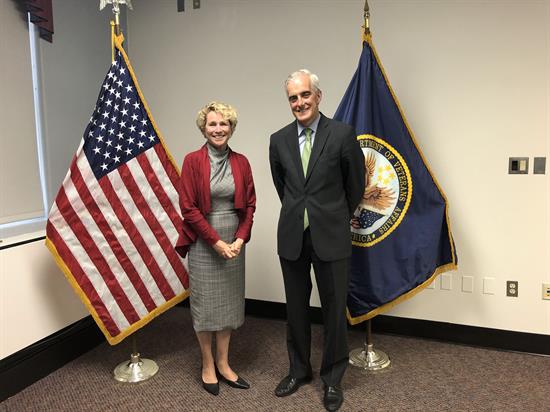Preventing Veteran Suicides Through Better DataVeteran suicides are a national crisis, and although Congress has funded programs to prevent these tragedies, it needs to do more to make their findings readily accessible to researchers. Fortunately, there’s a simple fix.
Washington,
May 9, 2023
Tags:
Veterans
Originally published in Washington Monthly Arkansas Republican John Boozman, a senior member of the Senate Committee on Veterans’ Affairs, recognized the potential and took up the cause. An optometrist and son of an Air Force Master Sergeant, Boozman co-sponsored the legislation. “This approach is key to empowering organizations to work together in the fight against veteran suicide,” he said. The bill became law as the Staff Sergeant Parker Gordon Fox Suicide Prevention Grant Program in honor of a U.S. Army Infantry School sniper instructor who died of suicide at 25. Over three years, it allocated $174 million to non-profit, private, and government groups ranging from veterans associations to social service agencies to tribal nations. Interventions addressing veteran suicide included peer support, assistance navigating the maze of public benefits, and even equine-assisted therapy. Boozman, along with Bergman and Houlahan, wisely understood that comprehensive data would be needed to pinpoint which endeavors worked to save the lives of service members. He hailed the Fox Grant Program for establishing “a common tool to measure the effectiveness of our programs and promote better information sharing, data collection, and continual feedback in order to identify what services are having the most impact.” Organizations receiving Fox Grants were required to obtain and convey data so that their efforts could be evaluated. The law also stipulated that the Department of Veterans Affairs (VA) provide congressional committees with annual reports on the effectiveness of the grants and that an independent third party conduct a study of the program. It was an encouraging concept, except for one significant oversight: The law didn’t provide for the calculation and dissemination of grantee-specific data about their impact. Most of that information was rolled up into aggregate numbers for the whole program, which was a huge problem. There was no way to determine whether a particular organization’s services were effective. Thankfully, there’s now a perfect opportunity to fix that gap so that essential data about community prevention efforts is made widely and readily available. Jon Tester, the Montana Democrat who chairs the Senate Committee on Veterans’ Affairs along with Boozman, recently introduced the Not Just a Number Act,which would expand a key VA document, the National Veteran Suicide Prevention Annual Report, to correlate veterans’ suicides with the utilization of VA health care and benefits, such as the GI Bill, job training programs, and disability compensation. It mandates that these findings be shared with the public. Both Tester and Boozman recognize that publicizing and utilizing data are pivotal to forming policy that affects veteran suicides. Tester said, “when it comes to preventing veteran suicide, we’ve got to be looking at all the data we have on hand to see what’s working and what’s not.” Boozman agreed: “Coordinating with successful veteran-serving organizations, (the Act) continues our commitment to modernize how we reach and serve veterans who struggle to get the mental health care and support they need. This legislation will help us make better data-driven policy decisions.” But the Not Just a Number Act needs one good tweak. Though the law makes the VA disclose its important suicide data, the measure doesn’t tap data generated by recipients of the Fox Grants—a trove of invaluable information that could help policymakers, veterans, social scientists, public health officials, and others drive down the still distressing number of veteran suicides. A simple amendment to the bill would make it fulfill its authors’ noble intentions. Each Fox Grant organization already administers five well-validated measures to veterans at the beginning and end of services. Those instruments examine suicidal ideation, mood-related symptoms, mental well-being, socioeconomic status, and social support. The data is transmitted to the VA. An amendment to the Not Just a Number Act should require the VA to crunch those pre-post figures, itemize them for each grantee, and place them in the public domain. Results should include items such as whether and how much scores on the five measures improve for veterans who complete the grantee’s services. Disabled American Veterans National Legislative Director Joy Ilem concurred: “Establishing open access to suicide-related data from veteran-serving organizations that receive VA funds promotes transparency and informs researchers and providers about the most effective suicide prevention interventions.” Revising the Not Just a Number Act would help fulfill the promise of the Fox Grant program to show what works when it comes to preventing veteran suicide by making the best data readily available. It would hold the recipients of Fox Grants to the high standards that apply to the VA. It would fulfill Senators Tester and Boozman’s vision and ultimately help save veterans’ lives. |
In the News



